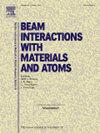Reevaluation of neutron energy spectrum in Heavy-Water neutron irradiation facility of Kyoto University research Reactor using multifoil activation method
IF 1.4
3区 物理与天体物理
Q3 INSTRUMENTS & INSTRUMENTATION
Nuclear Instruments & Methods in Physics Research Section B-beam Interactions With Materials and Atoms
Pub Date : 2024-11-01
DOI:10.1016/j.nimb.2024.165555
引用次数: 0
Abstract
The Heavy-Water Thermal Neutron Facility at Kyoto University Research Reactor (KUR) has been operational for boron neutron capture therapy (BNCT) since May 1974. Following a facility construction update in 1996, the facility name was changed to the Heavy-Water Neutron Irradiation Facility (HWNIF), and the neutron energy spectra were evaluated using the multifoil activation method. In May 2010, the KUR transitioned its operations from high-enrichment fuel to low-enrichment fuel. However, the neutron energy spectrum in the KUR-HWNIF has not been reevaluated with high accuracy since then. This paper reports the reevaluation of the neutron energy spectrum for the standard epithermal-neutron irradiation mode using the multifoil activation method. Based on the reevaluated results, the epithermal- and fast-neutron fluxes increased by approximately 34 % and 19 %, respectively. The neutron absorption dose rate at evaluation point was approximately 17 % lower than the previous one; however, it remained acceptable from the perspective of BNCT biological irradiation.
利用多线圈活化法重新评估京都大学研究用反应堆重水中子辐照设施的中子能谱
京都大学研究堆(KUR)的重水热中子设施自 1974 年 5 月开始运行,用于硼中子俘获治疗(BNCT)。1996 年设施建设更新后,该设施更名为重水中子辐照设施(HWNIF),并使用多线圈活化法对中子能谱进行了评估。2010 年 5 月,KUR 从高浓缩燃料过渡到低浓缩燃料。然而,自那时起,KUR-HWNIF 的中子能谱一直没有得到高精度的重新评估。本文报告了利用多线圈活化法对标准外延-中子辐照模式的中子能谱进行的重新评估。根据重新评估的结果,表热和快速中子通量分别增加了约 34% 和 19%。评估点的中子吸收剂量率比以前低了约 17%,但从 BNCT 生物辐照的角度来看,仍是可以接受的。
本文章由计算机程序翻译,如有差异,请以英文原文为准。
求助全文
约1分钟内获得全文
求助全文
来源期刊
CiteScore
2.80
自引率
7.70%
发文量
231
审稿时长
1.9 months
期刊介绍:
Section B of Nuclear Instruments and Methods in Physics Research covers all aspects of the interaction of energetic beams with atoms, molecules and aggregate forms of matter. This includes ion beam analysis and ion beam modification of materials as well as basic data of importance for these studies. Topics of general interest include: atomic collisions in solids, particle channelling, all aspects of collision cascades, the modification of materials by energetic beams, ion implantation, irradiation - induced changes in materials, the physics and chemistry of beam interactions and the analysis of materials by all forms of energetic radiation. Modification by ion, laser and electron beams for the study of electronic materials, metals, ceramics, insulators, polymers and other important and new materials systems are included. Related studies, such as the application of ion beam analysis to biological, archaeological and geological samples as well as applications to solve problems in planetary science are also welcome. Energetic beams of interest include atomic and molecular ions, neutrons, positrons and muons, plasmas directed at surfaces, electron and photon beams, including laser treated surfaces and studies of solids by photon radiation from rotating anodes, synchrotrons, etc. In addition, the interaction between various forms of radiation and radiation-induced deposition processes are relevant.

 求助内容:
求助内容: 应助结果提醒方式:
应助结果提醒方式:


